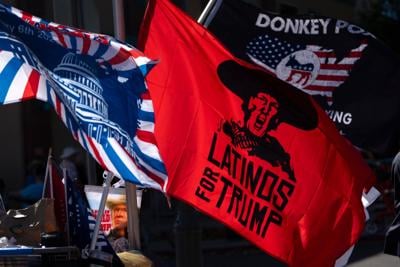
A flag reads "Latinos for Trump" outside of Donald Trumps' rally at Findlay Toyota Center on October 13, 2024 in Prescott Valley, Arizona. (Photo by Rebecca Noble/Getty Images)
It has been over a month since Donald Trump was officially voted back into the White House as the new president of the United States.
At the recent webinar, “The 2024 Presidential Election Aftermath,” a group of Latina journalists shared their campaign trail experience and issues they considered were overlooked during the election. While there was an agreement that there were challenges with mobilizing diverse voters in a rapidly evolving information environment, there was also the confirmation that Latinos are not a monolithic group. The panel was organized by Latina Futures 2050 Lab, an organization working to highlight the importance of Latinas and their intersectional identities in the U.S. through research and community partnerships.
Among the most important topics for Latino voters were the economy, immigration and reproductive rights.
Some of the leading polls identified that a majority of Latino men supported the Make America Great Again (MAGA) Donald Trump-JD Vance ticket, expecting to have a positive change in the economy, said Sonja Diaz, co-founder of Latina Futures 2050 Lab, organizer of the webinar.
Immigration is tied to the economy
The panelists agreed that the Democratic Party was part of the failure in mobilization, depicted on issues like immigration. Jean Guerrero, N.Y. Times reporter and Latina Futures journalist, recounted when the campaign trail started, Trump made immigration a number one issue and the Democratic Party failed to have a counter-narrative.
“Because of that failure, there is a perception among working-class Latinos and voters across the country that the Democratic Party is not much better, and in many cases no better than the Republican party when it comes to immigration,” said Guerrero.
To make things worse, Vice President Kamala Harris openly said she's in favor of stronger border security and has long targeted transnational cartels on the border. However, she failed to advocate for the rights of immigrants who've been here for years, who have jobs and kids and homes here and have never had a pathway to citizenship because of failures by both political parties.
Guerrero highlighted that the immigration issue is an economic issue for millions of families across the country. She said many breadwinners are being deported, affecting their families, or people being deprived of a living wage because they don't have a pathway out of the shadows.
“I think the Democrats have an imperative to frame immigration as an economic issue, and the only candidate who [did] that in this election was Trump saying that, ‘immigrants steal Black people and Latino Americans' jobs,” said Guerrero.
Measures on reproductive justice
Another controversial topic in both parties was abortion rights. Arizona and Florida had abortion ballot measures, and Mel Leonor Barclay, reporter with 19th News, wrote an article on Arizona's Latina voters and the shifting narrative about Latinas' abortion.
She said religion and cultural norms were the main reasons why people don’t support reproductive rights.
“I spoke to several conservative and Latina political consultants who were still leaning on this in their work to take down both of these ballot measures,” said Barclay. “They tapped into connections to churches and into messages about faith to talk to these voters, despite some of the data that had been coming out suggesting that whether you're Catholic or Protestant, that doesn't mean that you're not going to support these ballot measures.”
Barclay said Latinas voiced their concern about the anti-abortion laws despite their connection to religion. Many voted in favor of reproductive rights despite their religious beliefs.
“I think Latinas are trending younger. I'm also curious about how other pressures come to weigh on these voters. Latinas are more likely to be working class, and I think that many of these voters are less likely to be insured,” said Barclay.
A big part of their change of mind probably has to do with the access to the health care system and the access to reproductive rights, explained Barclay. There is also the idea that many immigrants have from their native countries, mainly in Latin America, where they think that only wealthy women have access to abortion, creating a sense of lack of fairness and lack of justice.
In Arizona, Proposition 139 passed. This establishes a fundamental right to abortion under the Arizona Constitution. In Florida, Amendment 4 failed, which would have guaranteed abortion rights. Although 57% voted to have a right to abortion, the Florida measure required 60% of the votes to pass.











(0) comments
Welcome to the discussion.
Log In
Keep it Clean. Please avoid obscene, vulgar, lewd, racist or sexually-oriented language.
PLEASE TURN OFF YOUR CAPS LOCK.
Don't Threaten. Threats of harming another person will not be tolerated.
Be Truthful. Don't knowingly lie about anyone or anything.
Be Nice. No racism, sexism or any sort of -ism that is degrading to another person.
Be Proactive. Use the 'Report' link on each comment to let us know of abusive posts.
Share with Us. We'd love to hear eyewitness accounts, the history behind an article.